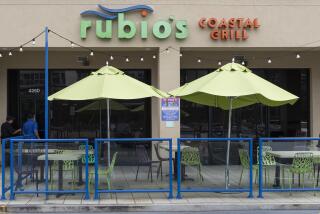Darden missteps, ‘Obamacare’ flap dent Olive Garden owner’s profit
- Share via
Darden Restaurants Inc.’s second quarter was far from appetizing, as the owner of Olive Garden and Red Lobster watched its net income plunge 37%.
The Orlando, Fla., restaurant company saw the sour numbers coming. Earlier in December, citing a litany of factors including negative blow-back over its response to the new national healthcare law, ineffective promotions and Superstorm Sandy -- for its decision to lower expectations for the quarter.
The prophesies came to pass: On Thursday, Darden executives said same-store sales at U.S. restaurants open at least a year tumbled a disappointing 2.7% for its three main chains for the period ended Nov. 25.
At Olive Garden, which has struggled for months to counteract disappointing sales with refreshed stores and national specials, sales sank 3.2%.
“We know that Olive Garden is well short of where it needs to be,” said Darden Chief Executive Clarence Otis in a conference call with analysts.
Red Lobster suffered a 2.7% dive. LongHorn Steakhouse slid 0.8%.
Darden’s strength continued to come from its smaller specialty restaurant group, which includes eateries such as Capital Grille and Bahama Breeze, where sales rose 0.7%.
Overall, Darden reported profit of $33.6 million, or 26 cents a share, down from $53.7 million, or 40 cents a share a year earlier. Revenue was up 7% to nearly $2 billion from $1.8 billion.
On Thursday, Darden’s stock was down as much as 1.8% to $45.96 a share. The stock, though stronger than a year ago, has tumbled sharply since late November.
The company now has 2,075 restaurants in its system, a 7% increase from last year.
Quiz: How well do you know fast food?
The sit-down casual dining sector as a whole will likely see modest growth again in 2013, as consumers step back from the category and competitors battle for market share, Darden President Andrew H. Madsen said in the conference call.
Budget-conscious families and younger customers are put off by the typically higher prices at casual restaurants compared with fast food and fast-casual options, Madsen said. Darden and its competitors have reacted by offering promotional price incentives and coupon deals.
Restaurants are also trying to adapt to customers’ demands, especially younger ones, looking for more premium menu options and a more convenient, flexible dining environment, Madsen said.
But Darden has faced other operating challenges as well.
This month the company publicly addressed speculation about how it would adjust to the so-called Obamacare national healthcare overhaul, promising not to slash hours for any of its 45,000 full-time employees.
The announcement came after the restaurant giant ran a controversial pilot program in which it hired more part-time workers to see if it could cut its healthcare costs once President Obama’s reforms are implemented in 2014.
Darden won’t be required to provide access to health coverage for its part-time workers, who constitute three-quarters of its 185,000 workforce.
But Otis said Thursday that the company’s actions were “misinterpreted” as “a stand against healthcare reform.”
“Because healthcare reform will remain a topic of much conversation over the next several months, it does contribute to our caution about performance for the remainder of the year,” he said.
ALSO:
Darden’s Olive Garden, Red Lobster sales disappoint
Darden Restaurants to buy Yard House chain for $585 million
Olive Garden parent Darden suffers from bad specials, ‘Obamacare’
More to Read
Inside the business of entertainment
The Wide Shot brings you news, analysis and insights on everything from streaming wars to production — and what it all means for the future.
You may occasionally receive promotional content from the Los Angeles Times.











